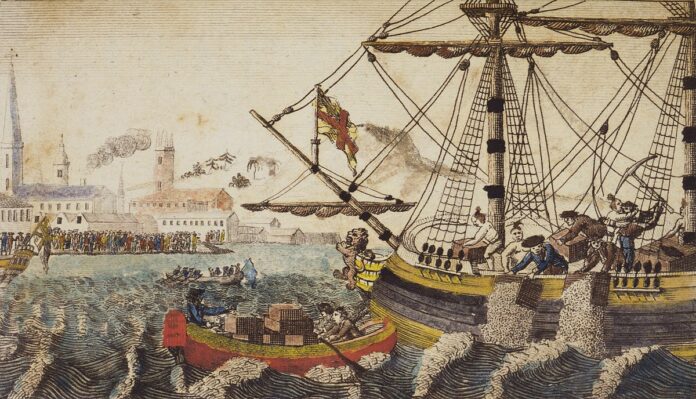A recent Washington Post column undertook a critical examination of one of the pivotal moments in America’s founding era, questioning whether the Boston Tea Party could be classified as an act of “terrorism” committed by “White men” engaging in an early form of Blackface. Theodore Johnson, a contributing columnist to the Post, speculated on the accuracy of Americans’ heroic portrayal of this rebellious act in Boston Harbor in response to the British Tea Act of 1773.
In recounting the collective cultural perspective on the event, Johnson acknowledged the iconic status the Boston Tea Party has acquired, symbolizing the revolutionary spirit that led to independence and encapsulating the rallying cry of “no taxation without representation.” However, he presented an alternative version of events that he claimed has been overlooked to avoid portraying the colonists as common criminals using racist face paint.
According to Johnson, a group of White men disguised themselves as Native Americans, applying copper to their faces and donning headdresses in a tradition reminiscent of later blackfaced minstrel shows. He argued that this act constituted a seditious conspiracy and property destruction, with the riotous mob trespassing on three ships and causing damage equivalent to nearly $2 million in today’s money—all in opposition to a duly passed law. Johnson hinted that such actions, if viewed today, might be deemed criminal or even terrorist in nature.
Drawing on Benjamin Carp’s work, “Defiance of the Patriots: The Boston Tea Party & the Making of America,” Johnson suggested that the incident could be classified as an act of terrorism by contemporary standards. The column, titled “Was the Boston Tea Party an act of terrorism? It depends,” offered various perspectives on the nature of the event.
While Johnson refrained from explicitly asserting that the conventional interpretation of the Boston Tea Party is detrimental, he proposed that the alternative perspective involving “White men” in Blackface may be more accurate. He emphasized the influential role of a nation’s myths in shaping its identity and acknowledged the evolving nature of these myths, which can blend fiction and truth to become sacred and resilient.
Furthermore, Johnson hinted at a perceived lack of representation for people of color in the traditional narrative of America’s founding, suggesting that the heroes of these myths don’t mirror the majority of present-day Americans. He concluded by noting the importance of seeing oneself in a national story, highlighting figures like Harriet Tubman, Rosa Parks, and Thurgood Marshall as examples of excluded individuals becoming a genuine expression of the nation’s virtues.




